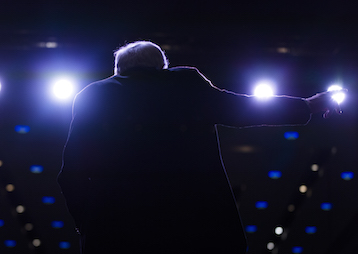Does Democratic Party Discord Portend Disaster at the National Convention?
Harping on the Nevada State Democratic Convention controversy fuels Bernie Sanders' challenge to the mainstream establishment. Bernie Sanders, speaking Saturday in Reno, Nev. (Evan Vucci / AP)
Bernie Sanders, speaking Saturday in Reno, Nev. (Evan Vucci / AP)
By Deirdre Fulton / Common Dreams
Bernie Sanders, speaking Saturday in Reno, Nev. (Evan Vucci / AP)
Deep divisions and disarray within the Democratic Party, fully surfaced in the wake of the Nevada convention brouhaha, suggest that July’s national convention in Philadelphia could serve as ground zero for a battle over the party’s very soul.
Beyond their calls for Bernie Sanders to exit the race before every state has had a chance to vote, establishment Dems this week expressed “fear,” as CNN put it, “that if Sanders does not rein in his supporters, the same ugly scene that occurred in Las Vegas last weekend could replicate itself in the Democratic National Convention in Philadelphia.”
But by doing so, these critics delegitimize Sanders’ campaign and supporters, as well as his potential role at the convention, and within the party itself. And they risk painting Hillary Clinton as a “sore winner.”
As Robert Borosage wrote in an op-ed on Wednesday:
California Sen. Barbara Boxer says that Sanders faces a “test of leadership” in cooling out his supporters and bringing them into the party. But the real test of leadership – as it has been throughout this campaign – isn’t about Sanders; it is about Clinton. Will the Clinton campaign be confident enough to be a gracious winner? Will it be smart enough to understand the importance not only of “accommodating” Sanders, but also of learning from him, embracing a bolder vision and speaking clearly to a far deeper pain? Will Clinton herself be capacious enough not simply to embrace the Sanders voters, but to reach out and earn their votes and excite their energy?
“The Clinton team is intent on putting on a tightly scripted convention show that displays unity behind Clinton,” Borosage wrote in a separate piece also published Wednesday.
And she has the ability to do so: “Clinton, the presumed nominee, will clearly have control of the convention,” Borosage pointed out. “Her ally, Democratic National Committee Chairwoman Debbie Wasserman Schultz, has stacked the platform and rules committees with Clinton supporters, which has earned a justified public rebuke from Sanders.”
But Sanders, he said, has different goals: “Sanders’ overall aim is to have the Democratic Party platform reflect his agenda.”
Borosage wrote:
His campaign stands ready to negotiate with Clinton about convention rules and the party platform. He is planning to debate the issues in committee meetings and on the floor of the convention hall. With his wins, Sanders expects a prime-time slot to address the convention, which would give him a platform to speak to the entire country. He will also likely continue rallying his supporters against the bigger threat of Trump.
To prevent him from doing so, Borosage warned, “would be the height of folly.”
Because, as D.D. Guttenplan wrote Tuesday at The Nation, “unless Clinton is able to convince a large proportion of Sanders supporters to vote for her, she’s unlikely to win in November.”
For her part, Wasserman Schultz dismissed Sanders’ response to the chaos in Nevada as “anything but acceptable.”
“The Sanders campaign and Sen. Sanders himself should outright condemn that specific conduct but they also need to take steps to prevent it and make sure their supporters understand the best way to express any frustration over process is to be orderly, not respond with violence and intimidation,” she added. “That needs to be unequivocally condemned, and unfortunately it has not been unequivocally condemned.”
Sanders’ statement on Tuesday said that his campaign “of course believes in non-violent change and it goes without saying that I condemn any and all forms of violence, including the personal harassment of individuals.”
But “to merely condemn without context is to perpetuate a different type of violence,” wrote lecturer and commentator Peter Bloom on Wednesday. “It is to be willfully blind to the institutional ways Democratic elites are alienating outside voices demanding genuine as opposed to surface level change to the Party and nation.”
Indeed, Bloom argued:
There is a risk that in calling out the most extreme aspects of Sanders supporters, the extremism of Clinton’s brand of Centrism will be dangerously covered up. What does it say if the localized violence in a Nevada caucus room trumps the global violence of a candidate who has advocated disastrous military interventions from Iraq to Libya? Should there be more worry for a protest at a rally than for the millions of lives ruined by an economic crisis by a financial sector that Clinton did little to resist and that continues to support her?
“The reversion to violence and threat by progressives backing Sanders is inappropriate and counter-productive,” he said. “However, it is also stands in stark contrast to the less overtly violent but ultimately potentially more destructive rallies of Clinton. It is to vocally support a candidate who admirably promises to ‘break down’ the very social and economic barriers that she and her allies have helped to build and preserve.”
Your support matters…Independent journalism is under threat and overshadowed by heavily funded mainstream media.
You can help level the playing field. Become a member.
Your tax-deductible contribution keeps us digging beneath the headlines to give you thought-provoking, investigative reporting and analysis that unearths what's really happening- without compromise.
Give today to support our courageous, independent journalists.






You need to be a supporter to comment.
There are currently no responses to this article.
Be the first to respond.